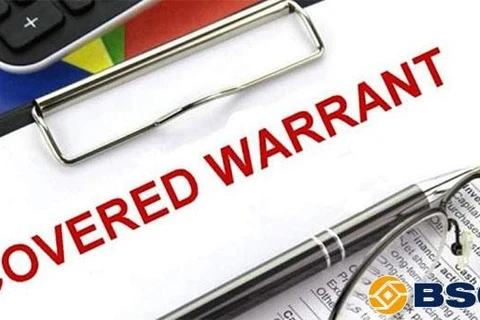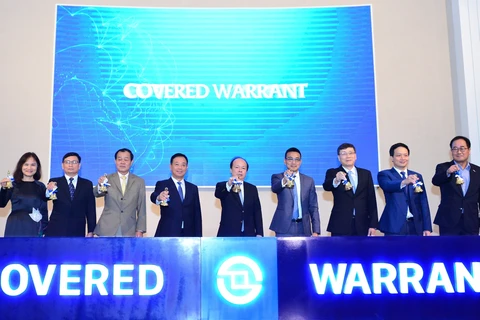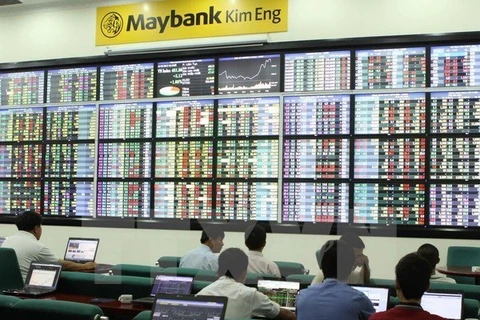 A Phu Nhuận Jewellery store in District 1, HCM City. The company is among the six stocks being traded on the covered warrant market. (Photo: pnj.com.vn)
A Phu Nhuận Jewellery store in District 1, HCM City. The company is among the six stocks being traded on the covered warrant market. (Photo: pnj.com.vn) Hanoi (VNS/VNA) - Securities companies participating in the new covered warrant market may find it less attractive to trade covered warrants of large-cap State-owned companies due to their low free-floating ratios.
Covered warrants are a new investment tool that allows holders to buy or sell a specific amount of equities, currency or other financial instruments, usually to or from a bank or similar financial institution, at a specified price and time. The underlying assets could also be stocks, commodities or indices. They offer lower investment costs and higher leverage ability than conventional financial products, and are expected to help investors limit losses and make higher profits.
A firm's free float ratio is the percentage of outstanding shares that are available for trading on the stock market. The higher a company's free-float ratio is, the more attractive the shares are to investors and the less vulnerable they are to price manipulation, tinnhanhchungkhoan.vn reported.
In addition, securities companies are accountable for hedging risks when issuing covered warrants for the selected companies’ stocks. Therefore, any stock with a high free-float ratio and large number of shareholders will have a more attractive and safer covered warrant.
Large-cap State-owned companies are becoming less attractive to investors because of their low free float ratios.
Having a large portion of shares owned by the State makes companies vulnerable to big deals, so they have a large impact on the stock market. Minority shareholders are rarely able to influence the way a company is run, limiting the quality of corporate governance and efficiency and making their shares less suitable to be traded on the covered warrant market.
The new covered warrant market was launched on June 28. Sixteen covered warrants of six listed stocks, including dairy producer Vinamilk (VNM), Phu Nuan Jewellery JSC (PNJ), steel producer Hoa Phat (HPG), Military Bank (MBB), retailer Mobile World (MWG) and tech group FPT (FPT), are being traded on the new market.
Those private equity firms may not have the biggest volumes of listed shares or the biggest market values but they have very high ratios of free-float shares, which makes it easier for investors to trade their shares and covered warrants. FPT has a free float ratio of 78.97 percent. The numbers for PNJ, WMG and MBB are 78.14 percent, 62.81 percent and 57.17 percent, respectively.
At the moment, 26 of the 30 largest stocks by market capitalisation and trading liquidity in the VN30 basket are eligible for covered warrant trading.
Those 20 other firms meet the guidelines but have not yet had their covered warrants issued by securities firms. If the first covered warrants are successful, the other 20 will likely be issued soon.
To be traded on the covered warrant market, a stock must be a large-cap in the VN30 basket, have a high daily average trading volume and a minimum free float ratio of 20 percent.
The four other blue chips – Vietcombank (VCB), Vietinbank (CTG), brewer Sabeco (SAB) and PetroVietnam Gas (GAS) – are not yet available because their free-float ratios are below 10 percent.
The State, through the Vietnam National Oil and Gas Group (PVN or PetroVietnam) is the major shareholder in PV Gas, holding a 95.76 percent stake. Major shareholders in Vietcombank, Vietinbank and Sabeco own at least 90 percent of each company.
But after the VN30 basket review by the Ho Chi Minh Stock Exchange takes effect on August 8, the number of large-cap firms’ stocks available for covered warrant trading will be reduced to 24.
The bourse last week announced that Bank for Investment and Development of Vietnam (BID) and insurance group Bao Viet (BVH) will be added to the VN30 basket to replace DHG Pharmaceutical JSC (DHG) and HCM City Infrastructure Investment JSC (CII).
But BID and BVH will not be eligible for covered warrant trading for the same reason as Vietcombank, Vietinbank, Sabeco and PV Gas.
The State Bank of Vietnam is the biggest shareholder in BIDV, holding a 95.28 percent stake, while the Ministry of Finance and the Japanese group Sumitomo Life hold 89.5 percent of Bao Viet. – VNS/VNA
VNA
























